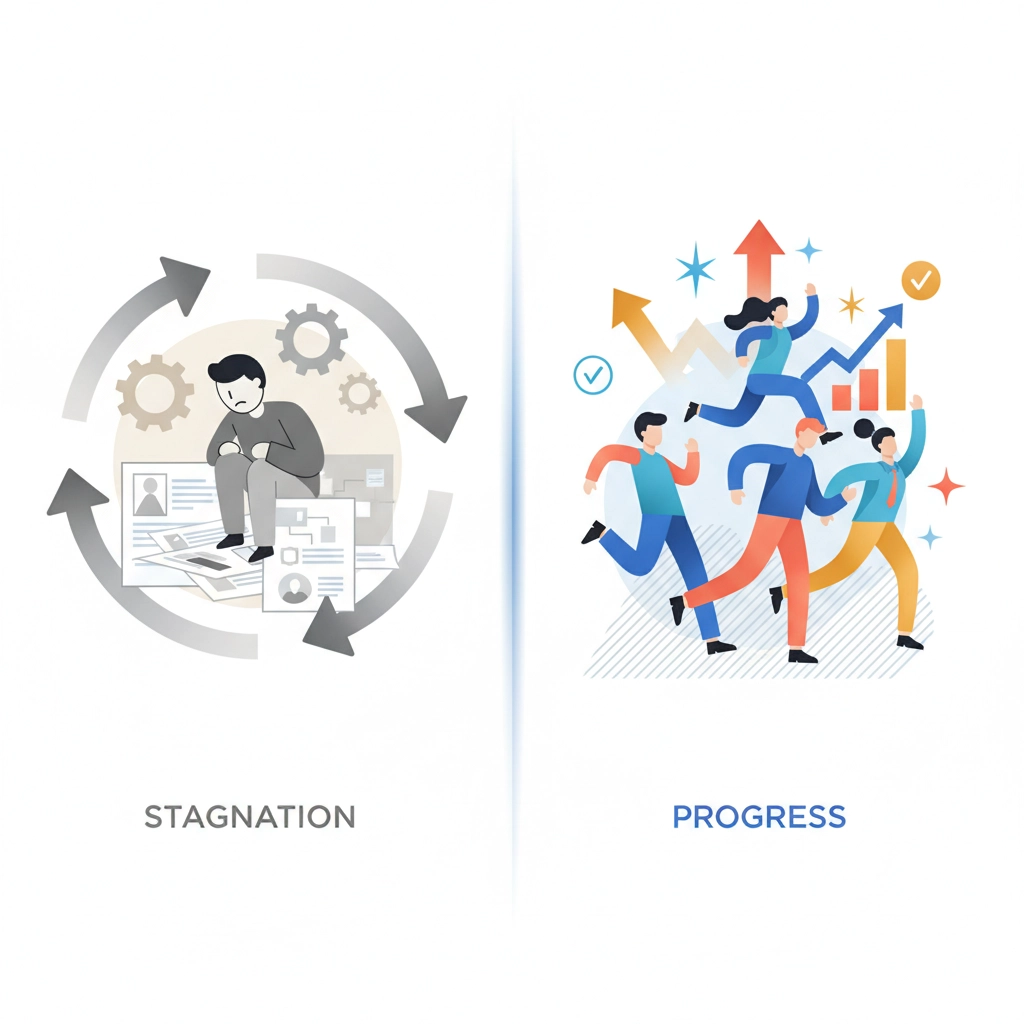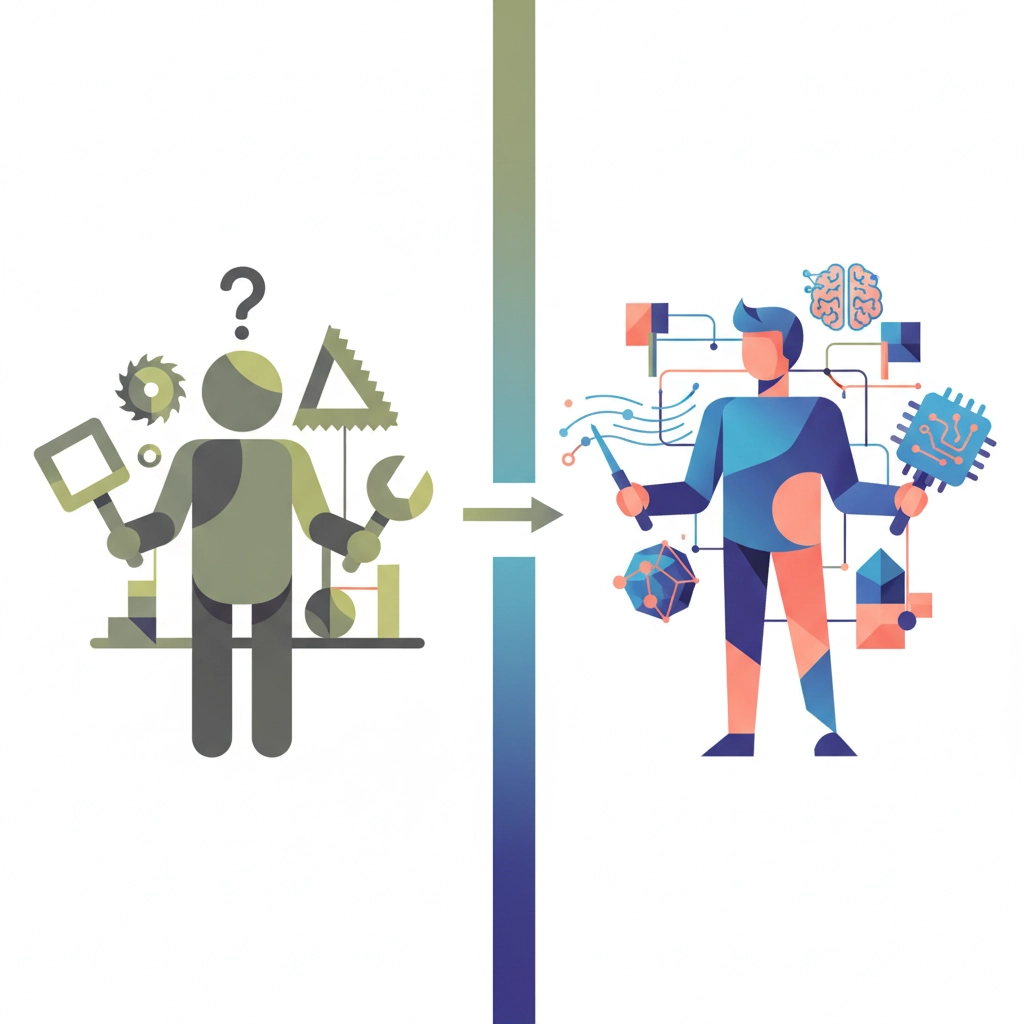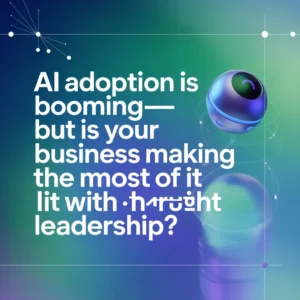Right, let's cut through the noise. If you're running an SME in 2025 and still debating whether AI matters for your business, you've already missed the starting gun. But here's the thing: most business leaders aren't dragging their feet because they don't want to embrace technology. They're stuck because they simply don't know where to start.
This isn't about being a Luddite. It's about being overwhelmed by an avalanche of options, consultants promising the moon, and conflicting advice from every direction. The result? Digital transformation paralysis that's quietly killing your competitive edge while your rivals sprint ahead.
The brutal truth is that 67% of UK SMEs are stuck in this exact position: drowning in digital possibilities but starving for clear direction. Meanwhile, businesses with dedicated AI leadership are seeing 27% productivity boosts and saving hundreds of hours through intelligent automation.
So how do you know if you're caught in this paralysis? Here are the seven warning signs that scream you need an AI-ready executive leading your transformation: before your competitors leave you in the dust.
1. You're Drowning in Data But Can't Extract Any Intelligence
Your business generates mountains of data every single day. Sales figures, customer interactions, website analytics, social media metrics: it's all there, sitting in various systems like digital treasure waiting to be discovered.
Yet when someone asks, "What does this data actually tell us about our customers?" or "What should we expect next quarter?", there's just awkward silence.

This is the classic symptom of having data without intelligence. Your team can tell you exactly what happened last month, but they can't predict what's coming next week. You've got dashboards up the wazoo, but zero actionable insights driving strategic decisions.
An AI-ready executive doesn't just collect data: they architect systems that transform raw information into predictive intelligence. They know how to implement machine learning processes that spot patterns humans miss, identify opportunities before competitors do, and turn your data avalanche into a strategic advantage.
2. No One's Actually in Charge of Your Digital Future
Here's a question that'll make most SME leaders squirm: "Who's your Chief AI Officer?"
If your answer is "We don't have one" or "That's handled by IT," you've just identified problem number two. You're treating AI like a technical upgrade rather than a fundamental business transformation.
Companies with dedicated AI leadership see 10% greater ROI on their technology investments and are 24% more likely to outperform peers on innovation. That's not because they've got bigger budgets: it's because they've got someone at executive level whose job is to bridge the gap between what's technically possible and what's strategically valuable.
Without this role, AI remains an IT project instead of a business revolution. Your competitors who've appointed AI-focused executives? They're already three steps ahead.
3. Analysis Paralysis Has You Stuck in Planning Mode
Planning matters, obviously. But there's planning, and there's over-planning to the point where you never actually do anything.
If you've been "researching digital transformation options" for more than six months, you've got analysis paralysis. While you're busy comparing vendors, reading whitepapers, and attending webinars about the latest trends, your competitors are actually implementing solutions and learning from real-world results.

The lean startup approach works for digital transformation too. You don't need to solve everything at once. You need to start somewhere, measure what works, and iterate quickly. But that requires executive leadership with the confidence to make decisions based on incomplete information: a skill that AI-ready executives have in spades.
4. Your Goals Are Vague (Or Non-Existent)
"We want to be more digital" isn't a strategy: it's wishful thinking.
Too many SMEs dive into transformation with fuzzy objectives like "improve efficiency" or "modernise our processes." Without specific, measurable goals, you'll end up investing in the wrong technology, frustrating your team, and wasting money on solutions that don't solve actual problems.
An AI-ready executive starts with ruthless clarity about what success looks like. They define specific KPIs, set realistic timelines, and create accountability structures that ensure every technology investment directly contributes to business outcomes.
The difference between vague goals and crystal-clear objectives is often the difference between transformation success and expensive failure.
5. You're Relying on Internal Staff Who Lack the Specialist Expertise
Your IT manager might be brilliant at keeping the servers running and fixing printer issues, but that doesn't make them qualified to architect a comprehensive AI strategy for your business.
This is one of the most common: and expensive: mistakes SMEs make. They assume that because someone's technically minded or has been involved in previous digitisation efforts, they've got the expertise to lead a full transformation.

State-of-the-art digital transformation requires specialist knowledge, proven experience, and strategic thinking that goes far beyond technical skills. It requires understanding how AI can reshape entire business models, not just automate existing processes.
An AI-ready executive brings that depth of experience. They've seen what works, what doesn't, and how to navigate the inevitable challenges that emerge during transformation. More importantly, they can translate complex technical possibilities into clear business value.
6. Your Team Doesn't Have the Skills (And No One's Teaching Them)
Here's a harsh reality check: implementing new technology without properly training your team is like buying a Formula 1 car and expecting your staff to figure out how to drive it by watching YouTube videos.
Many SMEs assume that digital natives will naturally adapt to new AI tools and processes. This assumption guarantees frustration, resistance, and ultimately failure.
Effective workforce development for AI transformation isn't about a quick demo or a half-day training session. It requires structured learning programmes, ongoing support, and clear progression pathways that help employees see how new skills benefit their careers, not just their workload.
An AI-ready executive understands that technology transformation is ultimately people transformation. They invest in comprehensive training, create support systems, and ensure that your team feels empowered rather than threatened by change.
7. Leadership Doesn't Really Understand What AI Can Do
The most telling sign that you need AI-ready executive leadership? When senior leaders can't articulate how AI specifically benefits your business beyond generic statements about "efficiency" and "automation."
If your leadership team can't explain how AI might transform your customer experience, streamline your operations, or create new revenue streams, you're missing the strategic vision that drives successful transformation.

Consider this: AI-powered processes can handle the work equivalent of 20+ full-time staff members in many businesses. But unlocking that potential requires understanding not just what AI can do, but how it fits into your specific business model, industry challenges, and growth objectives.
Without this understanding at executive level, you'll never get the stakeholder buy-in, resource allocation, or strategic focus needed for meaningful transformation.
The Path Forward: Why Fractional AI Leadership Makes Sense
Recognising these warning signs is the first step. The second is taking action before your competitors pull further ahead.
For most SMEs, hiring a full-time Chief AI Officer or Digital Transformation Director isn't financially realistic. You need the expertise without the £150k+ salary commitment.
That's where fractional and interim leadership becomes your secret weapon. You get executive-level AI expertise exactly when you need it, without the long-term overhead or recruitment risks.
The businesses thriving in 2025 aren't necessarily the ones with the biggest budgets: they're the ones with the clearest vision and most decisive leadership. They've recognised that digital transformation isn't a technical project; it's a leadership challenge that requires AI-ready expertise at the top.
The question isn't whether your business needs to embrace AI: it's whether you'll lead the charge or watch from the sidelines while your competitors transform the market around you.
Time to make the call. Your future market position depends on the leadership decisions you make today.


